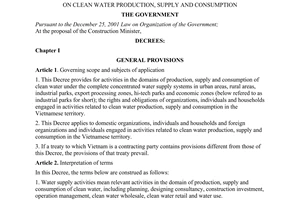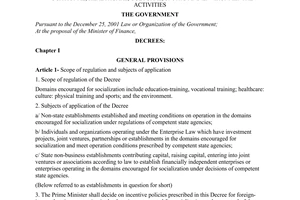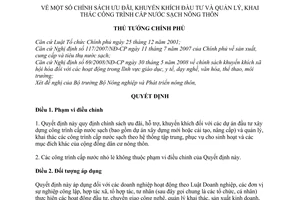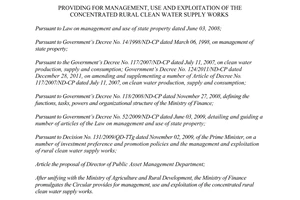Nội dung toàn văn Decision No. 131/2009/QD-TTg of November 02, 2009, on a number of investment preference and promotion policies and the management and exploitation of rural clean water supply works
|
THE
PRIME MINISTER |
SOCIALIST
REPUBLIC OF VIET NAM |
|
No. 131/2009/QD-TTg |
Hanoi, November 02, 2009 |
DECISION
ON A NUMBER OF INVESTMENT PREFERENCE AND PROMOTION POLICIES AND THE MANAGEMENT AND EXPLOITATION OF RURAL CLEAN WATER SUPPLY WORKS
THE PRIME MINISTER
Pursuant to the December 25,
2001 Law on Organization of the Government;
Pursuant to the Government's Decree No. 117/2007/ND-CPofJuly 11, 2007, on clean
water production, supply and consumption;
Pursuant to the Government's Decree No. 69/2008/ND-CP of May 30, 2008, on
incentive policies for socialization of activities in the fields of education,
health care, vocational training, culture, sports and environment;
At the proposal of the Minister of Agriculture and Rural Development,
DECIDES:
Article 1. Governing scope
1. This Decision prescribes the preferential, support and incentive policies applicable to investment projects on construction of clean water supply facilities (including projects on new construction, renovation and upgrading) and the management and exploitation of clean water supply works in concentrated systems in service of daily-life activities and other purposes of rural population communities.
2. Small and single water supply facilities are not governed by this Decision.
Article 2. Subjects of application
This Decision; applies to enterprises operating under the Enterprise Law, public non-business units, cooperatives, cooperative groups and individuals (below collectively referred to as organizations and individuals) that conduct activities of investment, technology transfer, exploitation management, production and trading in. the provision of services on. rural clean water.
Article 3. Conditions and implementation principles
1. Conditions:
Organization and individuals must have schemes on production and business, service provision and/or technology transfer; have the capability to manage the exploitation and commit to provide clean water-related services for rural population communities under projects approved by competent authorities.
2. Implementation principles:
a/ Rural clean water supply projects and works must comply with planning and satisfy criteria on the prescribed scales and standards in order to raise the living standards of population communities.
b/ Assets created from state budget sources, ODA, contributed capital of communities, donations, for construction of rural clean water supply works will be used only for the purpose of serving the interests of communities and not be distributed or used for other purposes.
Article 4. Incentive and support policies in rural clean water supply activities
1. Land incentives:
a/ Rural clean water supply projects and works in service of communities will be allocated land by the State with land use levy payment and exempt from land use levies or leased land by the State and exempt from land use levies.
b/ For land allocated or leased by the State, its use rights must not be included in the asset value of investment projects and must not be exchanged, transferred, donated, presented or leased; must not be mortgaged or guaranteed for borrowing loans; and must not be contributed as capital for production and business cooperation.
c/ The allocated or leased land must be used for proper purposes and in accordance with the land law; if such land is used for improper purposes or ineffectively, it will be recovered by the State.
2. Tax incentives:
a/ Organizations and individuals earning incomes from the management and exploitation of rural clean water supply projects or works will enjoy business income tax preferences as provided for in Article 8 of the Government's Decree No. 69/2008/ND-CP of May 30, 2008, on incentive policies for socialization of activities in the fields of education, vocational training, healthcare, culture, sports and environment.
b/ Establishments conducting business in various forms, excluding the activities prescribed at Point a, Clause 2 of this Article shall fulfill tax obligations according to law.
3. State budget supports and capital rinsing:
Organizations and individuals investing in rural water supply projects or works are entitled to:
a/ Enjoy state budget capital supports at levels calculated according to the total estimates of projects approved by competent authorities:
+ Not exceeding 45%. for district townships;
+ Not exceeding 60%, for delta and coastal areas;
+ Not exceeding 75%, for other rural areas;
+ Not exceeding 90%, for communes meeting with exceptional difficulties, ethnic minority, mountainous, transversal coastal and island areas, border communes.
The state budget support funds for the construction of rural clean water supply works in localities outside the areas hit by socioeconomic difficulties, which can be fully recovered with expenses correctly and fully calculated according to regulations, shall be returned to the state budget through basic amortization of fixed assets. Provincial-level People's Committees shall decide on charge rates payees and the use of such revenue source.
b/ Borrow preferential credit according to current regulations.
c/ Be given priority in re-borrowing fund lent to the Vietnamese Government as concessional loans by international organizations.
d/ Raise capital in the form of contribution of shares, contribution of capital from laborers in units or communities; raise capital from other lawful sources through cooperation, joint venture with domestic and foreign enterprises, economic organizations, financial institutions and individuals.
4. Rural clean water price subsidy supports:
If the clean water prices decided by provincial-level People's Committees are lower than the costs correctly and fully calculated according to regulations, provincial-level People's Committees shall annually consider and provide subsidies from local budgets in order to ensure the legitimate rights and interests of water suppliers.
Article 5. Rural clean water supply work management or exploitation models
1. Depending on specific
conditions on work sizes, water supply and treatment technologies as well as
local socio-economic characteristics,
any of the following models can apply:
a/ Management and operation by individuals:
b/ Management and operation by cooperatives;
c/ Management and operation by public nonbusiness units, including rural clean water and environmental sanitation centers, clean water management boards, etc.
d/ Management and operation by enterprises, including joint-stock companies, limited liability companies, state-owned one-member limited liability companies, irrigation work exploitation management companies, etc.
2. Fully qualified organizations and individuals can manage, operate and exploit rural clean water supply works in mutually agreed forms, bidding or order placement according to current regulations.
Article 6. Handling of assets upon change of rural clean water supply service providers
1. For assets and works financed with investment capital from the state budget or originating from the state budget:
a/ Upon the change of managers or operators of rural clean water supply establishments, assets shall be inventoried and re-valued for recovery and handover to other organizations or individuals for management, operation and service provision.
b/ The transfer, contractual assignment, lease or sale of state-owned assets will be decided by provincial-level People's Committees and comply with current regulations.
Organizations and individuals assigned to manage and operate clean water supply establishments invested with state budget capital or state budget-originated capital shall remit the fixed asset amortizations for assets invested with state budget capital or state budget-originated capital into local budgets for forming funding sources for investment in clean water supply works and more beneficiaries. Provincial-level People's Committees shall decide on the collection and remittance levels and modes, as well as the use of this revenue source.
c/ If no organizations or individuals wish to contractually undertake, lease or buy the assets or works, provincial-level People's Committees shall consider and decide to assign them to public non-business units or commune-level People's Committees, population communities in those localities for management and operation, not dividing them to any other organizations or individuals.
d/ If state-owned assets or works are unusable, provincial-level People's Committees shall direct functional agencies to organize the liquidation of these assets according to current regulations.
2. For assets and works created from capital sources other than the state budget capital or not originating from the state budget, when being hand-changed, re-sold or re-organized to suit enterprises of other types, current relevant regulations will apply.
Article 7. Organization of implementation
1. The Ministry of Agriculture and Rural Development shall perform the state management of clean water supply activities in rural areas nationwide.
2. The Ministries of: Planning and Investment: Finance: Education and Training: Health: Construction; and Natural Resources and Environment; and concerned agencies shall, within the ambit of their functions, tasks and powers, coordinate with provincial-level Peoples Committees in implementing the policies prescribed in this Decision.
3. Provincial-level People's Committees shall:
a/ Coordinate with ministries and branches in formulating their master plans on rural clean water supply, which will serve as a basis for formulation of projects, support plans and plans on investment promotion and mobilization.
b/ Perform the state management of rural clean water-related activities under approved planning, ensuring non-stop clean water supply activities and sustainable environmental protection; specify the assignment and decentralization of tasks to professional agencies and subordinate People's Committees for performance.
c/ Promulgate according to their competence specific incentive investment mechanisms and policies in accordance with law in order to attract investors to projects in their provinces.
d/ Regulate sources of state budget capital, state budget-originated capital, international aid capital to provide supports or price subsidies for rural clean water supply projects implemented by organizations or individuals, ensuring the proper purposes, subjects and priority localities, non-overlap and effectiveness.
e/ Regularly and irregularly inspect the operation of water supply works with regard to water quality; promptly settle complaints, denunciations about, or reports on, water quality or activities of providers of rural clean water supply services.
f/ Direct their functional agencies and subordinate People's Committees to apply measures to ensure social order and safety and create favorable conditions for investors throughout the process of their investment in. and exploitation of, works while ensuring the interests of users and communities.
g/ Direct subordinate People's Committees to realize the process of opinion contribution and supervision by population communities throughout the process of construction and provision of rural clean water supply services according to law.
h/ Work out plans on, and provide supports for, human resource training in service of rural clean water supply, thus meeting the requirements in this domain, with priority given to localities meeting with difficulties or exceptional difficulties.
Article 8. This Decision takes effect on January 1, 2010.
Article 9. Ministers, heads of ministerial-level agencies, heads of government-attached agencies and chairpersons of provincial-level People's Committees shall implement this Decision.-
|
|
FOR
THE PRIME MINISTER DEPUTY |





